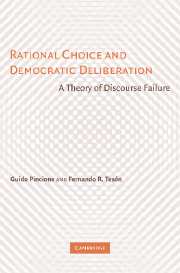Book contents
- Frontmatter
- Contents
- Preface
- Acknowledgments
- 1 Introduction
- 2 The Epistemic Argument for Deliberation
- 3 The Rational Choice Framework
- 4 The Resilience of Discourse Failure
- 5 Symbolism in Political Argument
- 6 Discourse Failure and Political Morality
- 7 Non-Epistemic Defenses of Deliberation
- 8 Deliberation, Consent, and Majority Rule
- 9 Overcoming Discourse Failure: Voluntary Communities
- Index
8 - Deliberation, Consent, and Majority Rule
Published online by Cambridge University Press: 05 May 2010
- Frontmatter
- Contents
- Preface
- Acknowledgments
- 1 Introduction
- 2 The Epistemic Argument for Deliberation
- 3 The Rational Choice Framework
- 4 The Resilience of Discourse Failure
- 5 Symbolism in Political Argument
- 6 Discourse Failure and Political Morality
- 7 Non-Epistemic Defenses of Deliberation
- 8 Deliberation, Consent, and Majority Rule
- 9 Overcoming Discourse Failure: Voluntary Communities
- Index
Summary
Consent and Reasonableness
In this chapter we examine the relationships between political deliberation, consent, and majority rule. To what extent can deliberation generate consent to social policies? What is the connection between deliberation and majority rule? Some defenses of deliberative democracy rest on the idea that laws enacted after due deliberation conform to everyone's reason. Such laws reflect a reasonable consensus that, at a minimum, excludes imposing some people's will on others. An obvious worry here is how to make room for voting – and thus losers – in a deliberative democracy, given that a vote normally freezes deliberation well before the ideal convergence expected by theorists of reasonable consensus. On the view we want to examine now, deliberation cushions the conflict between political coercion and consent of the governed – a vexed conundrum of liberal political philosophy. We argue, however, that dissenters are coerced into accepting the majority's decision, and that prior deliberation does nothing to justify that sort of coercion. We also examine the obscure relationship that deliberation bears with majority rule in the theories defended by deliberativists and conclude that the encouragement to deliberate presupposes unnecessarily coercive politics, given more consensual alternatives.
How can deliberation expand the consensual basis of laws and policies? Some writers argue that appropriate deliberation helps citizens realize that there are several reasonable and mutually incompatible views on an issue.
- Type
- Chapter
- Information
- Rational Choice and Democratic DeliberationA Theory of Discourse Failure, pp. 204 - 227Publisher: Cambridge University PressPrint publication year: 2006



